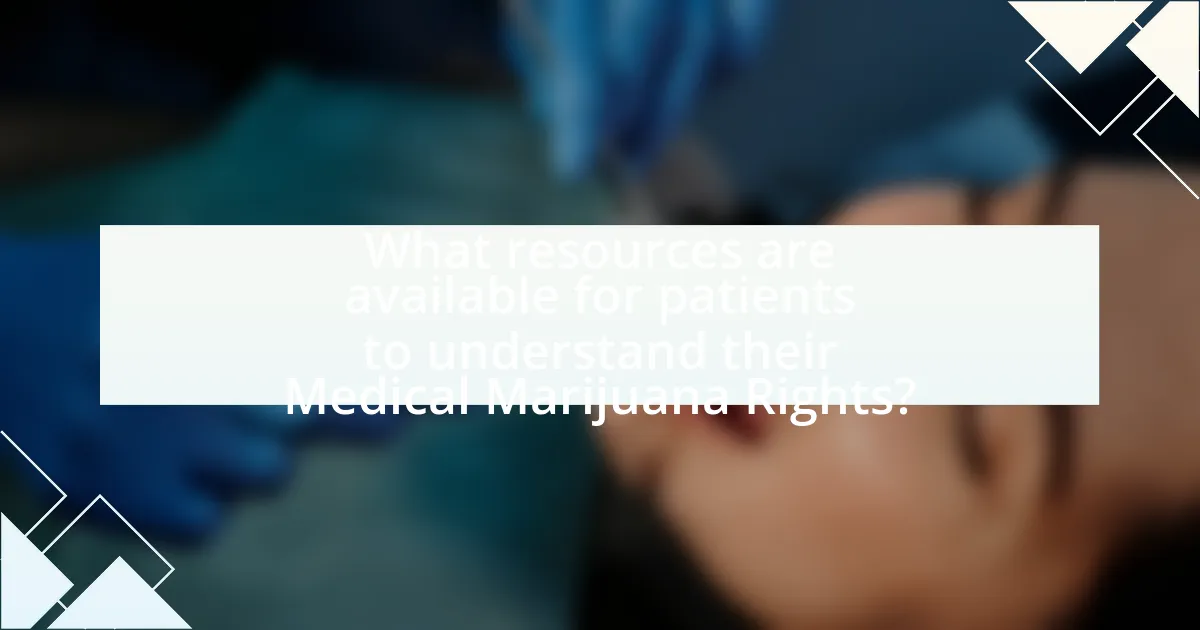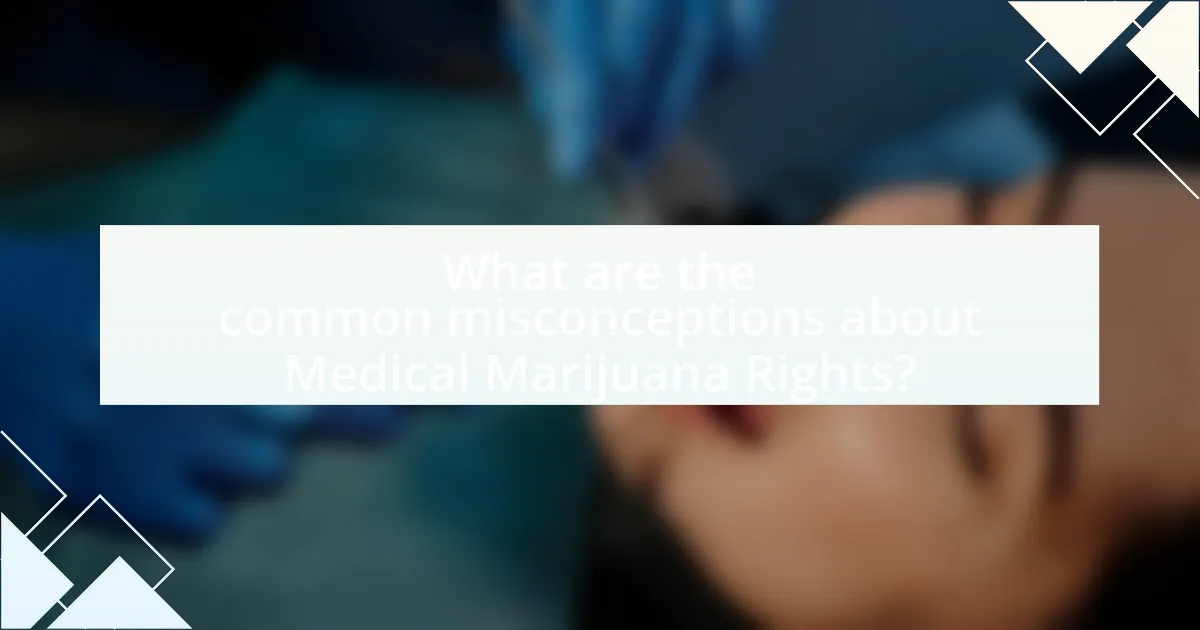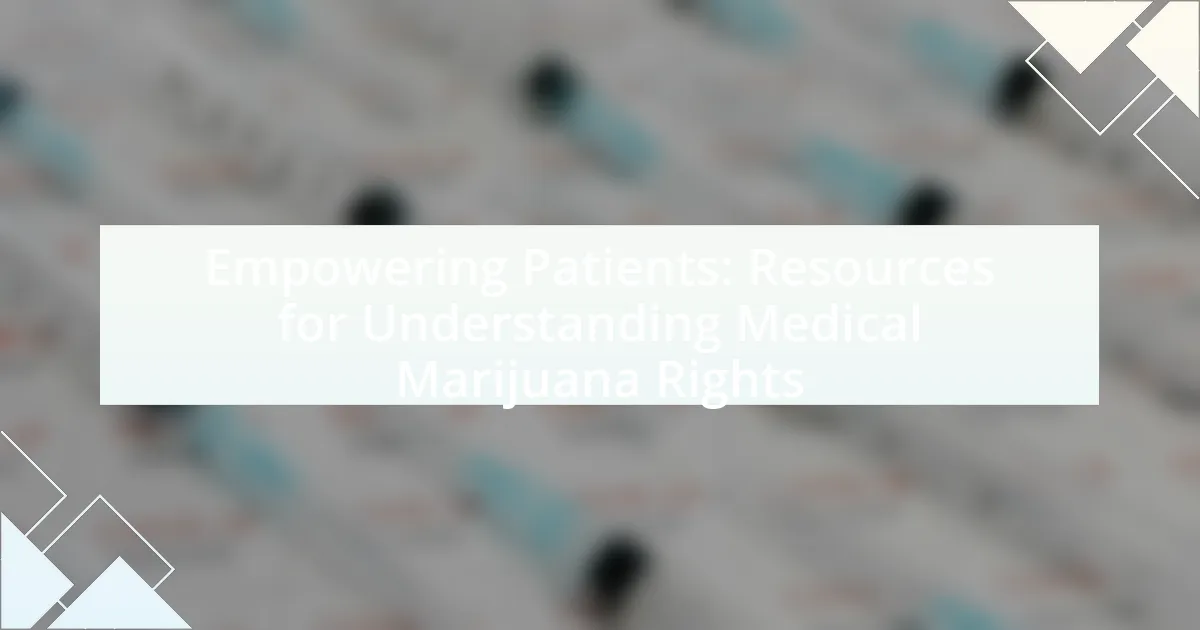Medical marijuana rights encompass the legal entitlements of patients to access, use, and possess marijuana for medicinal purposes as prescribed by healthcare providers. These rights vary significantly across jurisdictions, with 38 states in the U.S. legalizing medical marijuana as of 2023, each with distinct regulations regarding qualifying conditions and patient access. Factors influencing these variations include legislative frameworks, public opinion, and political climates. Understanding these rights is crucial for patients to make informed treatment decisions and advocate for themselves, while various resources, including state health department websites and advocacy groups, provide essential information and support. Additionally, misconceptions about medical marijuana rights persist, necessitating patient education and community involvement to effectively navigate and advocate for their rights.

What are Medical Marijuana Rights?
Medical marijuana rights refer to the legal entitlements of patients to access, use, and possess marijuana for medicinal purposes as prescribed by a licensed healthcare provider. These rights vary significantly by jurisdiction, with some states and countries implementing comprehensive medical marijuana programs that include patient registration, dispensary access, and legal protections against prosecution. For example, as of 2023, 38 states in the U.S. have legalized medical marijuana, allowing patients with qualifying conditions to obtain cannabis legally, demonstrating a growing recognition of its therapeutic benefits.
How do Medical Marijuana Rights vary by state?
Medical marijuana rights vary significantly by state, with some states fully legalizing its use for medical purposes while others impose strict regulations or prohibit it entirely. For instance, as of October 2023, 38 states and Washington D.C. have legalized medical marijuana, each with unique qualifying conditions, possession limits, and licensing requirements. In contrast, states like Idaho and Nebraska have not legalized medical marijuana at all. Furthermore, states such as California allow a wide range of medical conditions for eligibility, while others, like Florida, have a more limited list. This variation reflects differing state laws and public attitudes toward medical marijuana, impacting patient access and rights across the United States.
What factors influence the differences in Medical Marijuana Rights across states?
The differences in Medical Marijuana Rights across states are influenced by legislative frameworks, public opinion, and the political landscape. Each state has the authority to create its own laws regarding medical marijuana, leading to variations in regulations, qualifying conditions, and patient access. For instance, states like California have more comprehensive medical marijuana programs compared to states like Idaho, where medical marijuana remains illegal. Public opinion also plays a significant role; states with higher support for legalization tend to have more progressive laws. Additionally, the political climate, including the party in power and their stance on drug policy, can significantly affect the development and implementation of medical marijuana laws.
How can patients find out their specific rights in their state?
Patients can find out their specific rights in their state by consulting state health department websites, which often provide detailed information on medical marijuana laws and patient rights. Each state has its own regulations regarding medical marijuana, and these official resources typically outline eligibility, application processes, and legal protections for patients. Additionally, organizations such as the National Organization for the Reform of Marijuana Laws (NORML) and local advocacy groups can offer guidance and support in understanding these rights.
Why is understanding Medical Marijuana Rights important for patients?
Understanding Medical Marijuana Rights is crucial for patients because it empowers them to make informed decisions about their treatment options. Knowledge of these rights enables patients to access legal medical marijuana, ensuring they can utilize it safely and without fear of legal repercussions. For instance, in states where medical marijuana is legalized, patients must understand the specific regulations governing its use, possession, and distribution to avoid potential legal issues. Furthermore, awareness of their rights can help patients advocate for themselves in healthcare settings, ensuring they receive appropriate care and support related to their medical marijuana use.
What risks do patients face without knowledge of their rights?
Patients face significant risks without knowledge of their rights, including potential exploitation, inadequate care, and violation of privacy. Without understanding their rights, patients may be unable to advocate for appropriate treatment options, leading to suboptimal health outcomes. For instance, a study published in the Journal of Health Care for the Poor and Underserved found that patients who are unaware of their rights are more likely to experience discrimination in healthcare settings. Additionally, lack of awareness can result in patients not being informed about their options regarding medical marijuana, which may limit their access to effective pain management and symptom relief.
How can knowledge of rights empower patients in their treatment choices?
Knowledge of rights empowers patients in their treatment choices by enabling them to make informed decisions regarding their healthcare options. When patients understand their legal rights, such as the right to access medical marijuana where it is legal, they can advocate for themselves and seek treatments that align with their personal health needs and preferences. For instance, a study published in the Journal of Medical Internet Research found that patients who are aware of their rights are more likely to engage in discussions with healthcare providers about treatment options, leading to better health outcomes. This empowerment fosters a collaborative relationship between patients and providers, ensuring that patients can exercise their rights effectively in the context of their treatment choices.

What resources are available for patients to understand their Medical Marijuana Rights?
Patients can access various resources to understand their medical marijuana rights, including state health department websites, legal aid organizations, and advocacy groups. State health department websites provide official information on medical marijuana laws, eligibility, and application processes specific to each state. Legal aid organizations often offer free or low-cost legal advice regarding medical marijuana rights and can assist patients in navigating legal complexities. Advocacy groups, such as the National Organization for the Reform of Marijuana Laws (NORML) and the Marijuana Policy Project (MPP), provide educational materials, updates on legislation, and support for patients seeking to understand their rights. These resources collectively empower patients by ensuring they have access to accurate and relevant information regarding their medical marijuana rights.
How can patients access legal resources regarding Medical Marijuana Rights?
Patients can access legal resources regarding Medical Marijuana Rights through various channels, including state health department websites, legal aid organizations, and specialized cannabis law firms. State health departments often provide comprehensive information on medical marijuana laws, application processes, and patient rights specific to each state. Legal aid organizations may offer free or low-cost legal assistance to patients navigating medical marijuana regulations. Additionally, specialized cannabis law firms can provide expert legal advice and representation for patients facing legal challenges related to medical marijuana use. These resources ensure that patients are informed about their rights and can effectively advocate for themselves within the legal framework.
What types of legal assistance are available for patients seeking to understand their rights?
Patients seeking to understand their rights can access various types of legal assistance, including legal clinics, patient advocacy organizations, and specialized attorneys. Legal clinics often provide free or low-cost consultations to help patients navigate their rights related to medical marijuana use. Patient advocacy organizations, such as the National Organization for the Reform of Marijuana Laws (NORML), offer resources and guidance on legal rights and protections. Additionally, specialized attorneys with expertise in cannabis law can provide tailored legal advice and representation, ensuring that patients are informed about their rights under state and federal laws. These resources are essential for empowering patients to make informed decisions regarding their medical marijuana use and legal standing.
How can online platforms help patients navigate Medical Marijuana laws?
Online platforms can assist patients in navigating Medical Marijuana laws by providing comprehensive, up-to-date information about legal requirements and regulations specific to their state or region. These platforms often feature interactive tools, such as eligibility quizzes and state-specific guides, which help patients understand their rights and the application process for obtaining medical marijuana. For instance, websites like Leafly and Weedmaps offer resources that detail local laws, including possession limits and qualifying conditions, ensuring patients have access to accurate legal information. Additionally, online forums and support groups enable patients to share experiences and advice, further enhancing their understanding of the legal landscape surrounding medical marijuana.
What educational materials can assist patients in understanding Medical Marijuana Rights?
Educational materials that assist patients in understanding Medical Marijuana Rights include state-specific legal guides, informational brochures from health organizations, and online resources from advocacy groups. State-specific legal guides provide detailed information about the laws governing medical marijuana in each state, including eligibility, application processes, and patient rights. Informational brochures from health organizations, such as the American Medical Association, offer insights into the medical uses of marijuana and legal considerations. Online resources from advocacy groups, like the National Organization for the Reform of Marijuana Laws (NORML), provide updates on legislation and patient rights, ensuring patients have access to accurate and current information.
What role do advocacy groups play in providing information about Medical Marijuana Rights?
Advocacy groups play a crucial role in providing information about Medical Marijuana Rights by educating patients and the public on legal frameworks, access, and usage. These organizations often conduct research, publish reports, and host events to disseminate accurate information regarding state laws and regulations surrounding medical marijuana. For instance, the National Organization for the Reform of Marijuana Laws (NORML) offers resources that detail the legal status of medical marijuana in various states, helping patients navigate their rights effectively. By raising awareness and promoting policy changes, advocacy groups empower individuals to understand and exercise their medical marijuana rights.
How can patients utilize government resources to learn about their rights?
Patients can utilize government resources to learn about their rights by accessing official websites and publications that outline legal protections and entitlements related to medical marijuana. For instance, the U.S. Department of Health and Human Services provides information on state-specific laws and regulations regarding medical marijuana use, which can help patients understand their rights in their respective states. Additionally, state health departments often publish guides and FAQs that clarify patient rights, eligibility for medical marijuana programs, and the application process. These resources are designed to ensure that patients are informed about their legal standing and can advocate for themselves effectively.

What are the common misconceptions about Medical Marijuana Rights?
Common misconceptions about medical marijuana rights include the belief that it is universally legal, that patients can use it without a prescription, and that it is a recreational substance rather than a legitimate medical treatment. In reality, medical marijuana legality varies by state, with some states allowing it under specific conditions and others prohibiting it entirely. Additionally, patients typically require a prescription or recommendation from a licensed healthcare provider to access medical marijuana legally. Furthermore, while medical marijuana can have recreational effects, it is primarily used to alleviate symptoms of various medical conditions, such as chronic pain, epilepsy, and nausea from chemotherapy, as supported by studies indicating its efficacy in these areas.
Why do misconceptions about Medical Marijuana Rights persist?
Misconceptions about Medical Marijuana Rights persist due to a combination of historical stigma, inconsistent state laws, and lack of comprehensive education. The historical stigma surrounding marijuana, rooted in decades of prohibition and negative media portrayal, has led to widespread misinformation about its medical benefits and legal status. Additionally, the patchwork of state laws creates confusion, as regulations vary significantly from one jurisdiction to another, leading to misunderstandings about what rights patients actually have. Furthermore, the absence of standardized educational resources contributes to the persistence of these misconceptions, as many patients and healthcare providers lack access to accurate information regarding medical marijuana use and rights.
What are the most prevalent myths surrounding Medical Marijuana Rights?
The most prevalent myths surrounding Medical Marijuana Rights include the belief that medical marijuana is a “gateway drug,” that it is not a legitimate form of medicine, and that patients can freely use it without legal repercussions. Research indicates that the “gateway drug” theory lacks substantial evidence, as studies show that most users do not progress to harder substances. Furthermore, numerous medical organizations, including the American Medical Association, recognize medical marijuana as a valid treatment option for various conditions, such as chronic pain and epilepsy. Lastly, while some states have legalized medical marijuana, patients must still adhere to specific regulations and obtain proper documentation to avoid legal issues.
How can patients combat misinformation regarding their rights?
Patients can combat misinformation regarding their rights by actively seeking accurate information from reliable sources, such as government health websites, legal aid organizations, and patient advocacy groups. Engaging with these credible resources ensures that patients receive up-to-date and factual information about their rights, particularly concerning medical marijuana laws, which can vary significantly by state. For instance, the National Conference of State Legislatures provides comprehensive information on state-specific medical marijuana laws, helping patients understand their legal rights and protections. Additionally, participating in community forums or support groups can facilitate discussions that clarify misconceptions and promote awareness of patients’ rights.
How can patients advocate for their Medical Marijuana Rights?
Patients can advocate for their medical marijuana rights by actively engaging in local and state legislative processes. This includes attending public hearings, contacting lawmakers, and participating in advocacy groups that focus on cannabis legislation. For instance, the National Organization for the Reform of Marijuana Laws (NORML) provides resources and guidance for individuals looking to influence policy changes. Additionally, patients can share their personal experiences with medical marijuana to raise awareness and support for its benefits, which can help shift public perception and influence decision-makers.
What strategies can patients use to effectively advocate for their rights?
Patients can effectively advocate for their rights by educating themselves about their medical conditions and the legal framework surrounding medical marijuana. Knowledge empowers patients to engage in informed discussions with healthcare providers and to understand their rights under state laws, which can vary significantly. For instance, in states where medical marijuana is legal, patients have the right to access cannabis for therapeutic use, as outlined in legislation such as the Compassionate Use Act. Additionally, patients should document their medical history and treatment plans, which can support their case when discussing options with healthcare professionals. Engaging with patient advocacy groups can also provide resources and support, enhancing their ability to navigate the healthcare system and assert their rights effectively.
How can community involvement enhance advocacy efforts for Medical Marijuana Rights?
Community involvement can significantly enhance advocacy efforts for Medical Marijuana Rights by fostering a collective voice that amplifies individual experiences and concerns. When community members actively participate in advocacy, they create a united front that can influence policymakers and public opinion. For instance, grassroots campaigns that involve local residents sharing personal stories about the benefits of medical marijuana can humanize the issue, making it more relatable and compelling to legislators. Research indicates that communities with strong advocacy networks are more successful in achieving legislative changes; for example, states that have seen increased public support for medical marijuana often have engaged community organizations that educate and mobilize citizens. This collective action not only raises awareness but also builds a supportive environment that encourages more individuals to advocate for their rights, ultimately leading to more effective policy changes.
What practical tips can help patients navigate their Medical Marijuana Rights?
Patients can navigate their Medical Marijuana Rights by understanding their state’s specific laws, obtaining a valid medical marijuana card, and keeping informed about any changes in legislation. Each state has unique regulations regarding medical marijuana use, including qualifying conditions and possession limits, which patients must familiarize themselves with to ensure compliance. Securing a medical marijuana card typically involves a consultation with a licensed healthcare provider who can assess the patient’s condition and recommend medical marijuana if appropriate. Additionally, patients should regularly check for updates on laws and regulations, as these can change frequently, impacting their rights and access to medical marijuana.

Leave a Reply